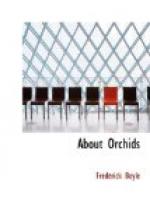There is another point also, which has varying force with different characters. The loss of life among those men who “go out collecting” has been greater proportionately, than in any class of which I have heard. In former times, at least, they were chosen haphazard, among intelligent and trustworthy employes of the firm. Trustworthiness was a grand point, for reasons hinted. The honest youth, not very strong perhaps in an English climate, went bravely forth into the unhealthiest parts of unhealthy lands, where food is very scarce, and very, very rough; where he was wet through day after day, for weeks at a time; where “the fever,” of varied sort, comes as regularly as Sunday; where from month to month he found no one with whom to exchange a word. I could make out a startling list of the martyrs of orchidology. Among Mr. Sander’s collectors alone, Falkenberg perished at Panama, Klaboch in Mexico, Endres at Rio Hacha, Wallis in Ecuador, Schroeder in Sierra Leone, Arnold on the Orinoco, Digance in Brazil, Brown in Madagascar. Sir Trevor Lawrence mentions a case where the zealous explorer “waded for a fortnight up to his middle in mud,” searching for a plant he had heard of. I have not identified this instance of devotion, but we know of rarities which would demand perseverance and sufferings almost equal to secure them. If employers could find the heart to tempt a fellow-creature into such risks, the chances are that it would prove bad business. For to discover a new or valuable orchid is only the first step in a commercial enterprise. It remains to secure the “article,” to bring it safely into a realm that may be called civilized, to pack it and superintend its transport through the sweltering lowland to a shipping place. If the collector sicken after finding his prize, these cares are neglected more or less; if he die, all comes to a full stop. Thus it happens that the importing business has been given up by one firm after another.




